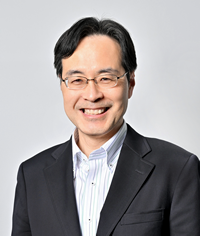About a year has passed since I was appointed as President of the Japan Neuroscience Society (JNS). During this time, we have experienced many changes, including the introduction of the Councilor system, the holding of the Councilor General Assembly, and the change in fiscal year, in conjunction with the Society's transition to a general incorporated association. I would like to express my deep appreciation for the support and understanding of our members.
First, with the transition to a general incorporated association, important matters of the Society (budget, etc.) will be deliberated at the Councilor General Assembly. In order to reflect diverse opinions to the management of the Society, councilors have been elected from the members with diverse backgrounds. Young and mid-career councilors and members have been appointed as members of various committees, and the next-generation members are actively participating in the management of the Society. Second, we are negotiating with a publisher to renew the contract for our Society journal, Neuroscience Research (NSR), and are currently at the final stages of negotiations. In light of a recent trend in international journals, NSR has decided to move to an open-access journal. We will be able to announce details soon. Furthermore, JNS considers international collaboration as one of the important missions. Dr. Yukiko Goda has been appointed to the Asia-Pacific Regional Committee of IBRO and the Board of Directors of the Society for Neuroscience (SfN), and Dr. Haruhiko Bito has been appointed as the SfN Program Committee Chair. I hope that our society will continue to strengthen international collaboration as a counterpart to these societies. To be "Our Neuroscience Society", I will continue to listen to your voices and improve our society so that JNS is meaningful to each member and contributes to the further development of neuroscience. We appreciate your continuous support.
I hope you were able to attend the 46th Annual Meeting of the JNS held in Sendai from August 1 to 4, 2023. Although the COVID-19 pandemic has brought us more efficient means such as online meetings and others, the normalization of the annual meeting provided us with an important opportunity for in-depth face-to-face discussions, communication, and interaction. The 47th Annual Meeting of the JNS (Neuro2024, Fukuoka, Japan) will be held on July 24-27, 2024. Neuro2024 will be the joint meeting with the Japanese Society for Neurochemistry and the Japanese Society of Biological Psychiatry, the 8th FAONS (Federation of Asian and Oceanian Neuroscience Congress). Many neuroscientists from Japan and abroad will attend. We hope that many of our members will participate in the congress and make it a lively event.
This year marks the 50th anniversary since the Society was founded in 1974 as "The Japan Neuroscience Association" (for the history of the Society, please refer to the Society's website "About the JNS" (https://www.jnss.org/en/about)). We are planning 50th anniversary events from 2024 to 2025, many of which will be organized in conjunction with the annual meeting. I hope that members will take the opportunity to reflect on the past and future of our Society and neuroscience. Rather than discussing the history of the Society, I would like to take this opportunity to expect the future of neuroscience. In 2050, the population in Japan is expected to decline by about 30%, and the working-age and young populations are expected to decrease significantly, which will require a drastic change in the social system, including measures to address the shortage of manpower. Unmanned and automated operations using artificial intelligence (AI) and digital technologies are expected to be one such measure, and the fields of education and research will also undergo major changes. The development of neuroscience through various technological innovations is expected to advance the elucidation of the principles of brain structure and function and the cure of brain diseases. I believe that the importance of understanding the nature of the brain, which defines our identity as human beings, will increase. I hope that the JNS will continue to develop sustainably and remain a central part of the community of neuroscientists working on these issues in the future.
April, 2024






